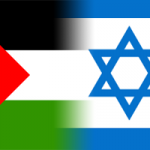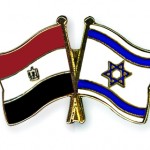 Thorny Road to Direct Israel-Palestine Talks
Thorny Road to Direct Israel-Palestine Talks: Arab League Foreign Ministers are meeting today in Cairo.
Talking to Spanish Foreign Minister Miguel Moratinos in Jerusalem on Wednesday, Israeli Prime Minister Benjamin Netanyahu said that continuing the construction freeze on West Bank settlements
would be impossible politically and would bring down the coalition.A Palestinian official told Reuters, "Abbas will tell [the Arab League] that, until this moment, there is nothing to convince us to go to direct talks.”
Israel-Palestine: Abbas’ Conditions, Netanyahu’s “Eastern Front” Response
Haaretz claims from Palestinian sources that Abbas will seek unequivocal clarifications from the US that the framework for direct talks will include a declaration that the Palestinian state will be based on the borders of 4 June 1967, with adjustments will be based on agreed exchanges of territory. The PA also wants an Israeli declaration that the construction freeze on settlements will continue and that building in East Jerusalem will stop.
Israeli cabinet minister Isaac Herzog (Labor Party) summarizes the dilemma of a "chicken-and-egg" situation. Talking to Israel Radio, he said:Abu Mazen (Abbas) says: "I don't want to enter direct negotiations until I know what the final result will be."
Netanyahu says: "Enter direct negatiations and I will also tell you what the final result will be."
Each one looks at it opposite, and we are in a sort of political trap.
Britain's Cameron in Turkey, Comments on Gaza: British Prime Minister David Cameron made his first official visit to Turkey, warning European countries about anti-Muslim prejudice and the slow pace of accession talks with Turkey. He told Turkish businessmen:
When I think about what Turkey has done to defend Europe as a NATO ally and what Turkey is doing now in Afghanistan alongside European allies, it makes me angry that your progress towards EU membership can be frustrated in the way it has been. I believe it's just wrong to say Turkey can guard the camp but not be allowed to sit inside the tent.
Cameron's counterpart Recep Tayyip Erdogan called Israel’s raid on the Freedom Flotilla an act of “piracy” and compared Israeli officials to Somali pirates. Cameron said that the incident was “completely unacceptable” and called for a speedy and transparent Israeli inquiry into the incident. Cameron also sharpened his tone on Gaza:
The situation in Gaza has to change. Humanitarian goods and people must flow in both directions. Gaza cannot and must not be allowed to remain a prison camp.
The Israeli embassy in the U.K. responded to Cameron quickly:
The people of Gaza are the prisoners of the terrorist organization Hamas. The situation in Gaza is the direct result of Hamas’ rule and priorities.
We know that the Prime Minister would also share our grave concerns about our own prisoner in the Gaza Strip, Gilad Shalit, who has been held hostage there for over four years, without receiving a single Red Cross visit.
Separation Fence Scandal: EA has already reported that Walajeh, a village in the Bethlehem Governorate 8.5 kilometres (5.3 miles) to the southwest of Jerusalem, is in danger of
being cut off from the rest of Palestinian lands, leaving 2,000 villagers encircled by Israeli settlements, roads, and security barriers.
In a court hearing on Sunday, it emerged that the order to expropriate village lands for the fence, which enabled the work to begin,
had expired a year ago. However, instead of ordering a halt to the work, the court issued an injunction requiring the state to explain within 45 days why construction should not be stopped.
The Society for the Protection of Nature in Israel and Palestinian villagers say that since the injunction was issued, the Defense Ministry and the contractors have been working much faster than before.
The Cost of an Eye: Emily Henochowicz, an Israeli-American studying at the Bezalel Academy of Art in Jerusalem, lost her left eye when Border Guards fired a tear gas canister during a demonstration following the raid on Freedom Flotilla.
According to Henochowicz, one policeman shot a canister directly at her face.
Haaretz says that one of its reporter also witnessed the incident.
Following her treatment in Jerusalem, her father was handed a bill for NIS 14,000 (around $3,600).
The Ministry of Defense refused to pay, claiming the tear gas was not fired directly at Henochowicz. The statement accused Henochowicz of putting herself at risk by voluntarily participating in a breach of the peace and accused:
From our reports, we know that the Border Police acted in accordance with the law at the violent demonstration at Qalandia, and that the shooting of tear gas canisters at demonstrators was justified. Of course, we regret that Emily Henochowicz was wounded in her eye. But under such circumstances, the Defense Ministry does not cover the expenses of medical treatment.
 Friday, July 30, 2010 at 17:42
Friday, July 30, 2010 at 17:42  On Thursday, the Arab League supposedly made its decision. The Qatari prime minister Hamed Ben Jasem al-Thani announced that the group would support Palestinian Authority leader Mahmoud Abbas if he decided to enter negotiations with Israel. Many newspapers reported that the Arab League gave the "green light" for direct talks.
On Thursday, the Arab League supposedly made its decision. The Qatari prime minister Hamed Ben Jasem al-Thani announced that the group would support Palestinian Authority leader Mahmoud Abbas if he decided to enter negotiations with Israel. Many newspapers reported that the Arab League gave the "green light" for direct talks.



